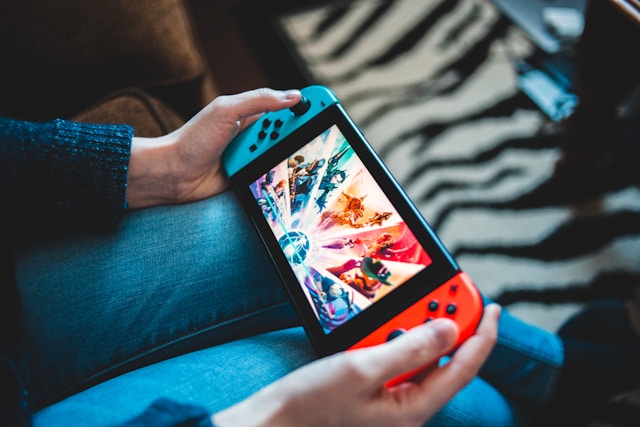- Change theme
AI-Powered Video Games - Adaptive Storylines and Smarter NPCs

AI-powered video games are changing the industry in exciting ways.
00:34 20 December 2024
Gaming has always been about escaping reality, but with the help of artificial intelligence (AI), that escape is becoming more immersive and personalized than ever.
Whether you're a passionate gamer, a developer crafting the next big hit, or a tech enthusiast marveling at the possibilities, AI-powered video games are changing the industry in exciting ways.
Adaptive storylines and smarter non-playable characters (NPCs) are just the beginning of this transformation. Let’s dive into how AI is revolutionizing game development and elevating player experiences.
What is AI Bringing to the Table?
AI in video games isn’t just about making the graphics look better or the gameplay smoother. It’s about introducing intelligence into the very fabric of the game. Think of NPCs that can strategize on the fly or storylines that shift based on your decisions. AI allows games to learn from your actions, making each playthrough feel unique.
This goes beyond static, pre-programmed behavior; AI introduces dynamic worlds where the game interacts with you, not just the other way around.
With advances in machine learning and procedural generation, developers are able to create massive, intricate gaming experiences with less manual effort.
Developers looking to explore cutting-edge AI tools for gaming and beyond can find valuable resources on platforms like AIToolsList.Com.
Adaptive Storylines: Your Choices, Your Adventure
Gone are the days when your choices in a game didn’t matter. AI is redefining storytelling in games by creating adaptive narratives that change based on how you play. Games like The Witcher 3: Wild Hunt and Detroit: Become Human have already demonstrated how player-driven decisions can alter story arcs, but AI takes this even further.
Here’s how it works:
- AI tracks your in-game decisions, analyzing your choices, behavior, and playstyle.
- The narrative adjusts dynamically to reflect your actions, creating unique consequences.
- Characters respond differently to your decisions, leading to multiple endings or even entirely different plotlines.
Imagine saving a character early in the game only to have them become a crucial ally—or enemy—later. These personalized experiences make gaming not just entertainment but an emotional investment. Developers are leveraging tools like natural language processing and machine learning to refine this storytelling, allowing for narratives as unpredictable as the players themselves.
Smarter NPCs: The Rise of Realistic Interactions
Let’s be honest—NPCs in older games were, at best, glorified placeholders. They followed predictable scripts and often repeated the same lines. But with AI, NPCs are becoming as complex and engaging as human players.
Modern AI enables NPCs to:
- Adapt to Player Behavior: AI-powered NPCs can adjust their strategies based on how you play. For instance, in Middle-earth: Shadow of Mordor, the Nemesis System allows enemies to "remember" you, developing personal vendettas and even evolving their skills for future encounters.
- Generate Realistic Dialogue: With tools like natural language processing, NPCs can engage in more natural conversations, making interactions feel genuine instead of robotic.
- Make Strategic Decisions: Instead of blindly rushing at the player, NPCs can analyze the situation and decide the best course of action, whether it’s to fight, retreat, or seek reinforcements.
These advancements blur the line between human players and computer-controlled characters, making in-game worlds feel alive and unpredictable.
AI for Developers: Behind the Scenes
AI isn’t just enhancing gameplay—it’s transforming the development process itself. For developers and designers, AI tools streamline tasks that were once painstakingly manual, freeing up time for more creative endeavors.
Here are a few ways AI is reshaping game development:
- Procedural Generation: AI can create vast, detailed worlds with minimal developer input. Games like No Man’s Sky use procedural generation to craft entire galaxies, each with unique planets, ecosystems, and challenges.
- Playtesting and Bug Fixing: AI algorithms can simulate thousands of gameplay scenarios, identifying bugs or balance issues more efficiently than human testers.
- Content Creation: From designing realistic character animations to generating lifelike soundscapes, AI speeds up the creation of game assets while maintaining high quality.
What This Means for Gamers
For gamers, AI means richer, more engaging worlds. You’re no longer just following a pre-set path; you’re actively shaping the journey. Whether it’s through morally complex choices, building alliances, or battling enemies who feel as cunning as a human opponent, AI ensures every playthrough feels fresh.
Additionally, AI helps create games that can cater to a wider range of skill levels. Adaptive difficulty ensures that new players don’t get frustrated while veterans still find a challenge. It’s an inclusive approach that keeps everyone invested.
The Future of AI in Gaming
The potential for AI in gaming is vast. Here’s what we might see in the near future:
- Hyper-Realistic NPCs: Imagine NPCs with lifelike emotions, capable of forming relationships with players over time.
- AI-Generated Storylines: Entire campaigns could be crafted on-the-fly, based on your preferences and past decisions.
- VR Integration: AI could make virtual reality even more immersive, creating reactive environments that respond to your every move.
Gaming is no longer just a hobby; it’s becoming an interactive art form. With AI at the helm, the line between games and reality will only continue to blur.
Final Thoughts
AI-powered video games are setting a new standard for what’s possible in the industry. From adaptive storylines to smarter NPCs, AI is making games more immersive, challenging, and rewarding. Whether you’re a gamer looking for the next big thing or a developer exploring innovative tools, the rise of AI in gaming offers something for everyone.
The era of AI in gaming has arrived—are you ready to play?
